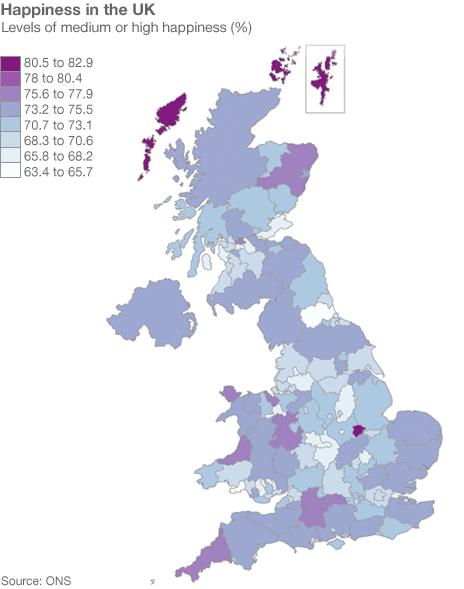ONS well-being report reveals UK's happiness ratings
- Published
- comments

Critics have questioned whether well-being can be measured
People who are married, have jobs and own their own homes are the most likely to be satisfied with their lives, the first national well-being survey says.
The Office for National Statistics data also suggests people in Wales and England are less satisfied than people in Scotland and Northern Ireland.
Teenagers and those above retirement age are the happiest, <link> <caption>the ONS suggests</caption> <url href="http://www.ons.gov.uk/ons/release-calendar/index.html" platform="highweb"/> </link> .
The survey is an effort to produce an alternative measure of national performance to Gross Domestic Product.
Prime Minister David Cameron has described it as crucial to finding out what the government can do to "really improve lives" - but Labour ridiculed the survey as a "statement of the bleeding obvious".
Three quarters of people aged 16 and over in the UK rated their overall "life satisfaction" as seven or more, with women more likely to report higher levels of well-being and a sense that their life is "worthwhile" than men but also higher levels of anxiety.
England and Wales had similar proportion of adults giving a low rating for "life satisfaction" - 24.3% and 25.3% respectively.
There were fewer people with low life satisfaction in Scotland (22.6%) and Northern Ireland (21.6%) - and fewer Northern Irish people gave a high rating when asked if they were "anxious yesterday" than the rest of the UK.
As a general trend, people were the most satisfied with life in their teenage years and when they reached retirement age, with happiness levels dipping during middle age.
Those aged 16 to 19 and 65 to 79 reported satisfaction levels considerably higher than the UK average of 7.4 out of 10.
People living in built-up or former industrial areas, such as South Wales, the West Midlands or London, tended to be less happy, while rural areas, such as Orkney and Shetland, and Rutland, in the East Midlands, were the happiest.
When broken down by marital status, married people were the most satisfied with their lives, followed by cohabitees, then single people, widows/widowers and people who were divorced.
Being healthy was also an important factor but does not guarantee happiness, the survey suggests, with 18% of those who reported good or very good health reporting low satisfaction with life overall, while 38% of those with bad health reported high or medium levels of satisfaction with life.
Some 45% of unemployed people rated their "life satisfaction" as below 7 out of 10. Among employed people the figure was 20%.
The survey of 165,000 people between April 2011 and March 2012 also found that where people lived was a crucial factor in whether they were happy or not.
A higher proportion of adults who owned their own property, either outright or with a mortgage, reported a medium/high level of life satisfaction - about 80% - than those who rented or had other kinds of tenures (about 68%).
But factors such as noise levels, public transport, crime, whether they felt safe walking home alone after dark and access to parks and open spaces also had an influence on happiness levels, the survey found.
The ethnic group with the lowest satisfaction rating was "Black/African/Caribbean/Black British", with an average rating of 6.7 out of 10. The highest was "Indian", with 7.5 out of 10.
The scheme aims to provide a better understanding of how society is doing, and could help form future government policy.
ONS wellbeing project director Glenn Everett said: "By examining and analysing both objective statistics as well as subjective information, a more complete picture of national well-being can be formed.
"Understanding people's views of well-being is an important addition to existing official statistics and has potential uses in the policy making process and to aid other decision making."
But Labour said it did not take a well-being survey to know that Mr Cameron was "taking Britain in the wrong direction".
Shadow Cabinet Office minister Michael Dugher said: "This is a statement of the bleeding obvious, a waste of taxpayers' money and it makes ministers look even more out of touch.
"You don't need a 'happiness index' to know that people without a job are unhappier than people in work - and we have over a million young people unemployed."
Steve Davies, from the Institute of Economic Affairs, also questioned the survey's aims, saying: "The government may be able to broadly do some things at the aggregate level that will make people less likely to be miserable.
"But it seems to me that we have enough trouble with governments trying to target something like GDP which we understand quite well without them having to try and target aggregate well-being as well.
"So I actually think that this could be quite dangerous because it could lead to government interfering in all sorts of aspects of people's personal life and I wouldn't like to go there."

- Published16 November 2010
- Published1 November 2011
- Published25 November 2010
- Published27 January 2011